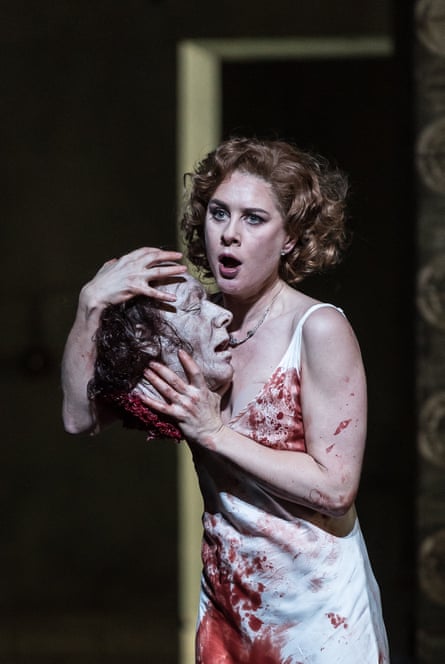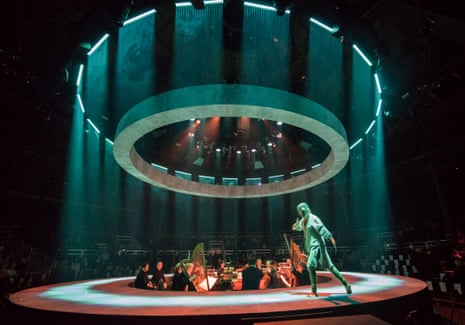After waiting so long for her husband to get home, what hard luck that Penelope had lost her voice for the first night of the Royal Opera’s The Return of Ulysses at the Roundhouse. Luckily the mezzo-soprano Christine Rice, who walked the role, is such a fine actor, and her replacement, Caitlin Hulcup, singing from the pit, such a responsive and adept singer, that scarcely a stitch was dropped, musically or dramatically. The professionalism needed for this kind of artistic teamwork cannot be overstated – especially with the audience up close, in-the-round, with nowhere to hide.
Following the company’s success there in 2015 with another Monteverdi opera, Orfeo, this production by John Fulljames, sung in English (in Christopher Cowell’s clear translation), had many strengths, not least a terrific cast and 40 singers from the Roundhouse community choir and the Royal Opera House Thurrock Community Chorus, as well as vocal students from the Guildhall School of Music and Drama.
One reason to step away from the proscenium conventions of Covent Garden was to be free and immersive. Christian Curnyn, conducting from the keyboard, and his expert Early Opera Company musicians, sat in the middle of a doughnut stage, outer and inner parts slowly revolving. Dominated by the ethereal, plucked sounds of the continuo group – two harps, two lutes, two guitars, as well as keyboards and lirone – this music is ever restless, ever beguiling. How the singers knew where to look for their conductor at any given point, as he rotated along with the players, was an additional challenge, valiantly overcome.

It took a while to grasp how the story, in neutral modern dress with a Japanese accent, designed by Hyemi Shin (sets) and Kimie Nakano (costumes), was being told and who was who. Soon the rich, compelling story, in which every character is flawed, exerted its grip, and incipient irritation fell away. Yes, describe this extraordinary Venetian Renaissance masterpiece as Shakespearean if it helps, but Monteverdian will do quite well enough.
One great asset was Roderick Williams’s flawless and moving Ulysses, flickering mercurially from hope to pathos to murderous hot temper. From the mostly British ensemble cast, watertight in quality, bass David Shipley (Antinous) and tenor Stuart Jackson (Irus) stood out, with striking contributions from Susan Bickley and Francesca Chiejina.
Catherine Carby’s Minerva, a gutsy Valkyrie type in gold-painted Dr Martens, and Samuel Boden’s Telemachus, jejune and lithe (am I obliged to mention his gym-fit physique?), managed to sing convincingly while circling round the musicians on a tandem. Not to be tried at home, and maybe not in the theatre either. That momentary wobble wasn’t good for those of a nervous disposition. Production lapses of this kind, in a three-hour evening, proved minor, though I did wonder for a moment if dry ice had just been invented. The sensational musicianship is not to be missed. Try to get to the Roundhouse wherever you live.

In Royal Opera’s main house, David McVicar’s 2008 production of Salome was back for its third revival, revitalised by director Bárbara Lluch and conducted with steely tension by Henrik Nánási. Each orchestral nuance was laid bare, spectral, screeching, fluorescent. The ROH orchestra sounded fierce and lustrous, brief problems with balance aside. However grotesque the stage action, Richard Strauss’s music achieves resonance of a different magnitude, ripping into our revolted emotions. That’s surely why we return to the opera but shy away from Wilde’s congealed 1891 play on which it’s so closely based.
This revival is strongly cast. Designed by Es Devlin in what might be a human abattoir, ornate dinner table glimpsed up above, a sweeping staircase to one side, it’s also spellbinding to watch.
As Narraboth, David Butt Philip delivers the opera’s opening lines – “Wie schön ist die Prinzessin Salome” – with piercing intensity. His role is brief but vital. Spurned by Salome, he retreats, broken, slumped against the wall, soon to kill himself. The young Page (Christina Bock), who in turn adores him, mirrors his actions, grief-stricken, like a limping puppy: a moment of authentic love, beautifully handled.
Michael Volle as the prophet Jokanaan (John the Baptist), singing with robust precision, and Michaela Schuster, overdone but forceful as a dipsomaniac Herodias, return to their roles.
Making her Royal Opera role debut as Salome and winning thunderous applause, Malin Byström showed how her more lyrical voice, modest in scale at first, could find new strength as required. She was molten in the opera’s closing 10 minutes when she sings her depraved heart out to the prophet’s severed head before – why not? – kissing it.
Byström kept overt sensuality to a minimum, moving through the Dance of the Seven Veils (choreographed as a psychological dream of womanhood by Andrew George, revived by Emily Piercy) with agility and poise. If you’re hoping for cheap thrills, look away: this Salome actually puts a dress on rather than strips off. John Daszak as the slobbering Tetrarch, small-time potentate, pawn to a greater power (here, Rome), danced a mean waltz and sang with the right toadying rapacity.
A relief to have the life-giving joys of Haydn’s Creation, full of animal magic but no sex, which launched Kings Place’s latest Unwrapped series, Time. Performed with brisk, punchy fervour by the Orchestra and Choir of the Age of Enlightenment and incisively conducted by Adám Fischer, it was blessed with three talented young soloists: soprano Charlotte Beament, tenor James Way and bass Dingle Yandell. The reduced forces gave irresistible verve to Haydn’s score. Time Unwrapped, full of intriguing concerts, continues all year. How reassuring to know I’ve already found a contender for the best of 2018 list.

Star ratings (out of 5)
The Return of Ulysses ★★★★
Salome ★★★★
The Creation ★★★★★
The Return of Ulysses is at the Roundhouse, London, until 21 January

Comments (…)
Sign in or create your Guardian account to join the discussion